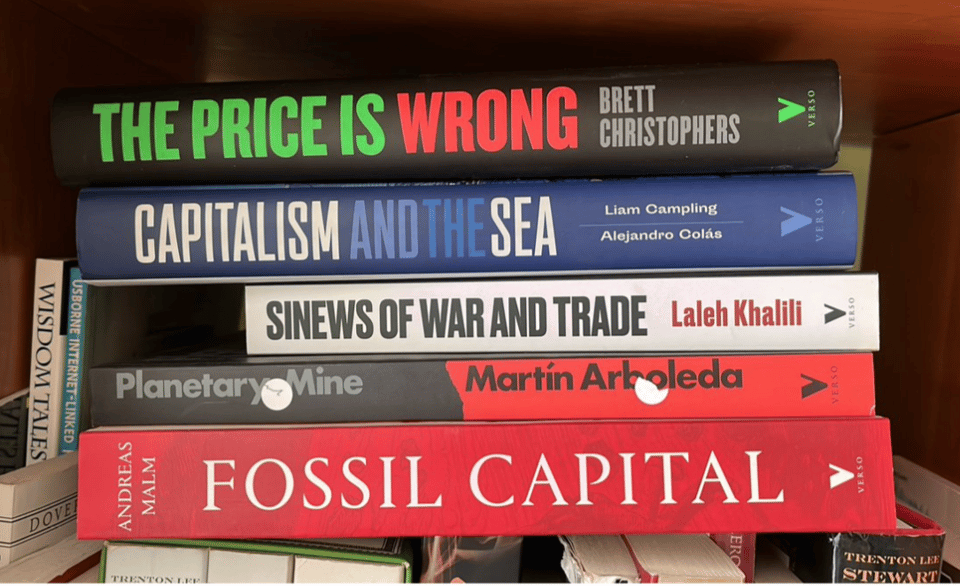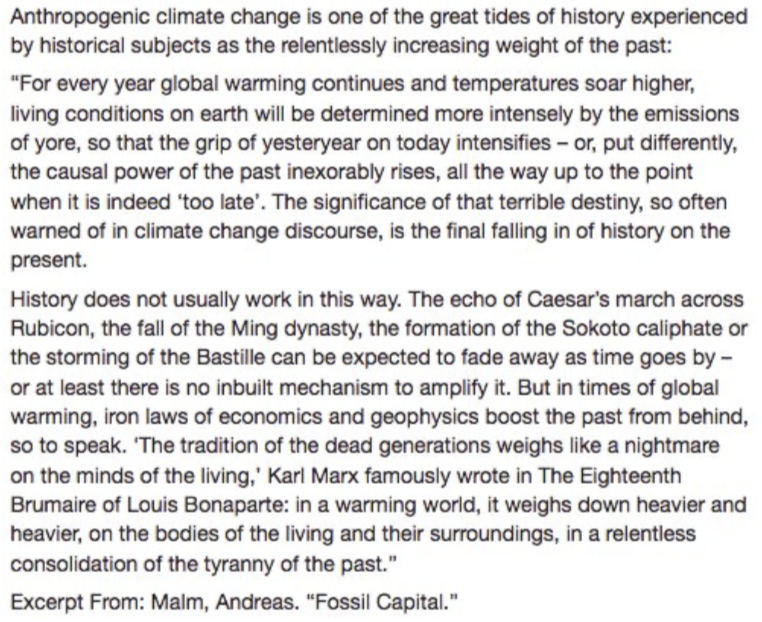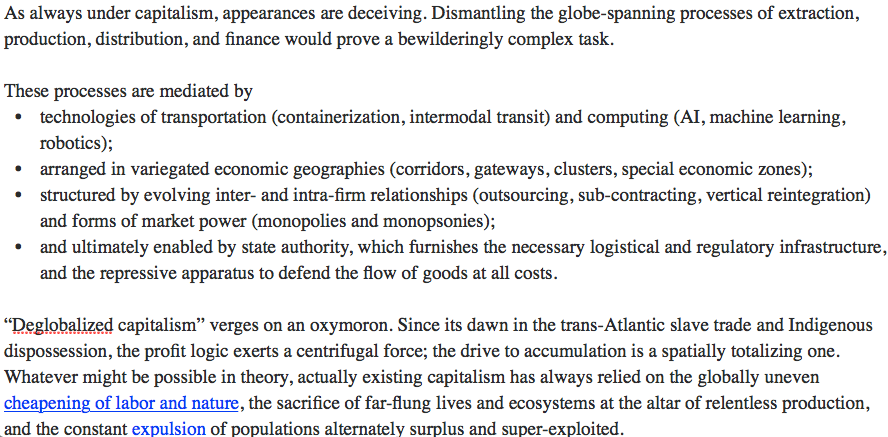Polycrisis Summer book club?
Welcome to the 5th edition of our dark-mode Polycrisis Dispatch. The unstoppable force of global capitalism meets the immovable object of global warming is the anti-meet cute at the heart of a spate of recent books. According to Vulgar Carbon, all books on the subject can be slotted into five different types. This week, we have a capsule review of them to whet your appetites. Interested in summer book club? Please email us mailto:asahay@gmail.com and mailto:kate@katemackenzie.net

The Price is Wrong, Brett Christophers:
For years, decades even, a key argument for climate action has been that cheap renewables will “inevitably” outcompete fossil fuels on price. But here are the facts so far: even though renewables are the world’s fastest-growing energy sources, fossil fuels are the source of too much energy, and the destination of far too much investment, to stay within safe limits. Capitalists like the returns from oil, gas and coal, which are higher than renewable energy; among other differences in their characteristics. That is the core argument of the book: profits matter, not just falling renewables prices. Will the energy transition go ahead only at the pace of profitability?
Christophers argues that renewable energy is too cheap to be profitable, with illuminating case studies of power systems across the globe. What sort of returns do investors earn?
How profitable are wind and solar power generation? What sort of returns do investors earn? Inevitably, there is no single, consistent answer: returns vary – often considerably – both historically and geographically. But most analyses of the issue conclude that an internal rate of return of around 5–8 percent would be what investors on average expect and achieve.
Little wonder, then, that companies accustomed to much higher returns than this serially thumb their noses at renewables. Most notable here are the big U.S. oil and gas companies, which typically do not proceed with new hydrocarbon projects unless returns of a minimum of 15 percent are anticipated. Asked at his company’s 2015 annual meeting why Exxon continued to snub solar and wind, CEO Rex Tillerson responded witheringly, ‘we choose not to lose money on purpose’.
For the author, the implications are clear: subsidizing renewables has been relatively easy, but actually leaving fossil fuels in the ground and taxing carbon interests is what is needed. That’s a gnarly task because it is irreducibly political.
The investment risk/return calculus of fossil or renewables is not a fact of nature but constructed by States. Christophers drills down into the complicated power markets of the US, Europe, and China to make his case. The book is worth it for these lucid discussions alone. Electricity markets are entirely regulated by governments. They have been aggressively privatised, liberalised and unbundled over the past four decades, with transmission being separated from generation and distribution – even in China.
This unbundling of generation and distribution has become more and more important since 2021, with soaring energy prices prompting opportunists to blame the transition to renewable energy in electricity systems. Within this context, three views emerged. Economists argued “just fix the market structure and incentives”; Companies argued, “governments should derisk us more, so we can invest with promise of bigger profits”; while the Left argued “no, the government must step in to undertake state ownership and production of electricity”. Whichever camp you are in, Christophers’ book has reset the terms of the debate.
2. Sinews of War and Trade, Laleh Khalili:
Ninety percent of the world's goods, and over 60 percent of its oil, spend time on the high seas. These facts were often little known or cared about until the 2020 Corona Oil Shock (remember negative oil prices?). This mid-pandemic event - the “Permian Pearl Harbor” - revealed maritime trade, logistics, and hydrocarbon transport to be, in Khalili’s telling, the “clearest distillation of how global capitalism operates today”. The University of Exeter professor of Gulf Studies maps out the history and provides a window into dockside workers, shipping merchants, oil companies, insurance firms, banks and their competing geopolitical visions of making ports and extralegal free trade zones in the Arabian peninsula.
3. Fossil Capital, Andreas Malm:
Malm’s book covers the rise of ‘Steam Power’ – or how carbon made capitalism. And how capitalism unmade the planet. He argues that climate change is "the relentless consolidation of the tyranny of the past".

Look out, also, for Malm's forthcoming Fossil Empire, on how carbon made empire. This amazing preview takes us from the rise of Steam Power to the pulverization of Gaza:
“This power derived from fossil fuels: steam allowed the admirals and captains to plug their boats into a current from the past, a source of energy external to the space and time of the actual battle, through which the ships could therefore shoot as though they had wings of their own. Britain’s military superiority was radically enhanced by its ability to mobilise the stock as a force for running the enemy down. Or, as the Observer noticed, with reference to Palestine: ‘Steam, even now, almost realizes the idea of military omnipotence and military omnipresence; it is everywhere, and there is no withstanding it.’Britain was ready to project the power of fossil fuels across the globe, after having proved its mettle in Palestine.”
4. Planetary Mine, Martín Arboleda:
Thea Riofrancos, in her brilliant review of Arboleda’s book, identifies what everyone who uses the term “globalization” should actually spell out:

But what is the planetary mine? For critical geographers, our physical world is an inverted wold of mines, indeed a HOLE WORLD. Arboleda argues that “[t]he dispersed fragments of the planetary mine are... dialectically bound to the pipes and cables tucked into the high-rise buildings of the megacities that have sprung out of nowhere in south China in just twenty years; in the myriad electronic gadgets spawned by vertically integrated electronics-manufacturing systems that have led to factories in Shenzhen employing up to 420,000 workers—a figure no automobile factory in the heyday of Fordism would have even dreamed of; and in the hulls and containers of the thousands of cargo vessels that make up the maritime commercial fleets of China, Japan, and South Korea, which have rendered the Pacific Ocean the main infrastructural corridor of world trade.”
We can see why Thea says, “Martín Arboleda is required reading for anyone interested in: extraction, capitalism, automation, Latin America, cities, value-form theory, China, supply chains”. Check out Arboleda’s presentation on the book here.
5. ‘Capitalism and the Sea', Liam Campling & Alejandro Colás
We had to get this after reading the cover blurb by historian of capitalism Jairus Banaji: "I can think of no other book that has dealt with the pivotal role of the sea in the evolution of capitalism... with as much innovation and more comprehensively than this fascinating [book]" '
With chapters covering circulation, order, exploitation, appropriation, logistics and offshore, Campling and Colás reveal the myriad ways in which the ocean was, and remains, a critical component of modern capitalism. Its role in enabling trade, resource provision and leisure alongside exploitation and the reproduction of inequalities is explained in the “continuities between todays’ highly financialised, centrally controlled global commodity chains” and the commercial capitalism that spawned our present day.
Capitalism and the Sea goes on to examine a new boundary to exploitation emerging in the unpredictable blowback from acidification, warming and expanding waters. The role of the sea is fast switching from carbon sink to ultimate determinant of climate change impacts. Sinking libertarian fantasies of freedom, the authors show how the legislation of maritime space is a long-standing feature of development, connecting historical European imperialism to modern-day concerns over supply chain robustness at chokepoints like the (clogged) Suez and (desiccated) Panama canals.
Vivid echoes of the new trade wars we spoke about last week resound in the ways Britain’s empire was challenged and usurped by other maritime powers: instead of protection for the fleets of the ‘East Indies’ companies, today we see competition over whose fleets of EVs will dominate the next transport revolution. While the tight relationship between the shipping industry and tax havens reveals the well-known contradiction of the notion that the shipping industry is reliant upon Flags of Convenience rather than on state-given rights.
Campling and Colás document how “the City of London retained an integral role in marine insurance, reinventing itself as a global financial and commercial hub by weaving together a web of overseas territories into an offshore world” but leave us with the stark reminder that: “greenhouse gases cannot be offshored”.
Things we liked:
Berlin Summit Declaration: Rodrik, Weber, Mazzucato, Tooze and many many more signed this declaration calling for more state investment in people-centred climate transition.
The ODI has a new report: “Trillions or billions?” reports on the potential for European pension and insurance funds to actually invest in Global South countries (EMDEs). It takes a robust analytical approach, considering the sorts of constraints identified by Advait Arun in a couple of essays for Polycrisis/Phenomenal World. Top lines for us: pension funds can potentially double their investments in EMDEs, but they’re still likely to concentrate around the “publicly-listed, investment grade assets in large emerging markets” which does not help those countries and projects that don’t meet those hurdles.
Analysis of China’s role in African Development Bank’s success at global financial reforms in the past year is a neat reminder of all that’s been achieved: IMF approving SDR recycling; Seat at the G20, African Union support for tax reform at the UN (and not at the tax-haven dominated OECD).
Add a comment: